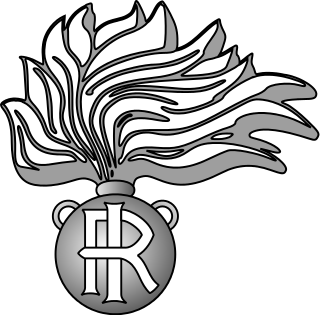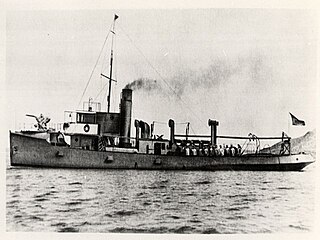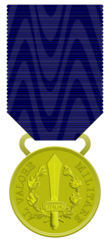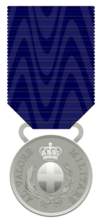
The Carabinieri are the national gendarmerie of Italy who primarily carry out domestic and foreign policing duties. It is one of Italy's main law enforcement agencies, alongside the Polizia di Stato and the Guardia di Finanza. As with the Guardia di Finanza but in contrast to the Polizia di Stato, the Carabinieri are a military force. As the fourth branch of the Italian Armed Forces, they come under the authority of the Ministry of Defence; for activities related to inland public order and security, they functionally depend on the Ministry of the Interior. In practice, there is a significant overlap between the jurisdiction of the Polizia di Stato and Carabinieri, although both of them are contactable through 112, the European Union's Single Emergency number. Unlike the Polizia di Stato, the Carabinieri have responsibility for policing the military, and a number of members regularly participate in military missions abroad.
The Silver Medal of Military Valor is an Italian medal for gallantry.

Inigo Campioni was an Italian naval officer during most of the first half of the 20th century. He served in four wars, and is best known as an admiral in the Italian Royal Navy during World War II. He was later executed by the Italian Social Republic for refusing to collaborate.
Portugal has a system of orders, decorations, and medals as a means of honouring individuals for personal bravery, achievement, or service to Portugal.
The War Cross for Military Valor is an Italian order for military valor. Established in 1922, the cross may be awarded only in time of war.
The Gold Medal of Military Valor is an Italian medal established on 21 May 1793 by King Victor Amadeus III of Sardinia for deeds of outstanding gallantry in war by junior officers and soldiers.
Colombian military decorations date back as far as the founding of the country. An early decoration was the Cruz de Boyacá that was awarded to the generals who led their forces to victory in the Battle of Boyacá in 1819. This early decoration lives on today as an incarnation of the highest order presented by the Colombian state. There is one decoration higher, but it is only awarded for military conflicts in defence of Colombia. Other than military decorations, Colombia presents decorations on behalf of the National Government, decorations for the National Police, and decorations from the Congress of Colombia.

Ernesto BurzagliCB GCMM GOA was a prominent figure in the Kingdom of Italy during the early 20th century. During a lifetime career in the Italian Royal Navy, he rose to the rank of admiral and chief of staff. In 1933, King Victor Emmanuel III appointed Burzagli as a senator in Rome.
The Bronze Medal of Military Valor is an Italian medal for gallantry.
Costanzo Picco was an Italian military officer and skier. He served as an officer during World War II in first the Italian 4th Army and later the Italian resistance forces. After WWII, he participated in the 1948 Winter Olympics, and served as a commander in the Italian Mountain Warfare School.
The War Merit Cross is an Italian military decoration. It was instituted by King Victor Emmanuel III during World War I on 19 January 1918. The award received major changes during World War II and currently is issued by the Italian Republic as well.

The Maurician medal is an honorary degree granted to a member of the Italian Armed Forces after 50 years of service. The commanding years are added afterward.

Guido Fibbia was an Italian Second World War fighter pilot in the Regia Aeronautica and in the Aeronautica Nazionale Repubblicana. He was credited with 9 enemy planes shot down flying with biplanes Fiat C.R.32, Fiat C.R.42 and monoplanes Macchi C.200, C.202, C.205, Fiat G.50, G.55 and the German Messerschmitt Bf 109. He was decorated with two Silver Medal of Military Valor, one Bronze Medal of Military Valor, one Croce di Guerra and one German Iron Cross 2nd Class.
Reginaldo Giuliani, better known as Father Giuliani, was a Dominican friar, a soldier and Italian writer.

The following is a list of the orders, decorations, and medals of Brazil:

The Italian honours system is a means to reward achievements or service to the Italian Republic, formerly the Kingdom of Italy, including the Italian Social Republic.

The Sardinian Crimean War Medal or, more formally, the silver medal for Military Valour for the Eastern Expedition 1855–1856 was a gallantry medal awarded by King Victor Emmanuel II of Sardinia for bravery during the Crimean War (1855–1856) against the Russian Empire. It is a variant of the Sardinian Medal of Military Valor.

RD 36 was a minesweeper built for the Regia Marina in 1919 and later transferred to the Regia Guardia di Finanza. She saw action during World War II and, for the action that led to her sinking, she became one of the three Italian warships to be awarded the Gold Medal of Military Valor "to the flag".
The Medal of Aeronautic Valor is an Italian medal awarded "for acts and enterprises of singular courage and skill aboard an aircraft in flight." Instituted in 1927, it is awarded at three levels: Gold, Silver and Bronze. The medal may be conferred on both Italian and foreign persons and entities and on both civilians and members of the Italian armed forces. It can also be awarded posthumously.

The Commemorative Medal of the War of Liberation is a decoration awarded by the Italian Republic to personnel who participated in military and partisan operations of the Italian co-belligerent forces or the Italian resistance movement against the Axis powers during the Italian campaign of World War II and the coincident Italian Civil War. It originated in 1945 as the Kingdom of Italy's Badge of the Ongoing War of Liberation Against the Germans, which the Italian Republic replaced with the Liberation War Badge in 1948. In turn, the Commemorative Medal of the War of Liberation replaced the Liberation War Badge in 1959.



















